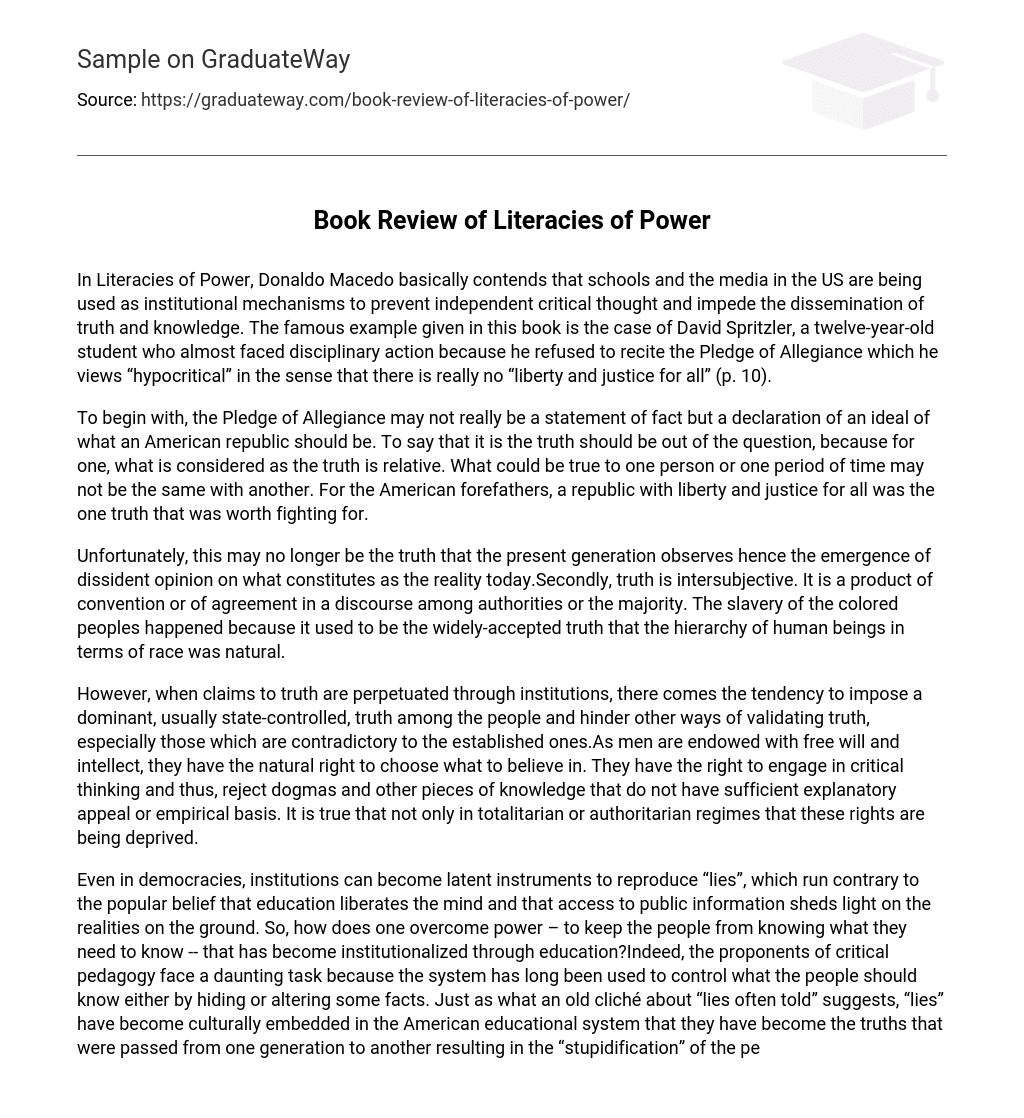In Literacies of Power, Donaldo Macedo basically contends that schools and the media in the US are being used as institutional mechanisms to prevent independent critical thought and impede the dissemination of truth and knowledge. The famous example given in this book is the case of David Spritzler, a twelve-year-old student who almost faced disciplinary action because he refused to recite the Pledge of Allegiance which he views “hypocritical” in the sense that there is really no “liberty and justice for all” (p. 10).
To begin with, the Pledge of Allegiance may not really be a statement of fact but a declaration of an ideal of what an American republic should be. To say that it is the truth should be out of the question, because for one, what is considered as the truth is relative. What could be true to one person or one period of time may not be the same with another. For the American forefathers, a republic with liberty and justice for all was the one truth that was worth fighting for.
Unfortunately, this may no longer be the truth that the present generation observes hence the emergence of dissident opinion on what constitutes as the reality today.Secondly, truth is intersubjective. It is a product of convention or of agreement in a discourse among authorities or the majority. The slavery of the colored peoples happened because it used to be the widely-accepted truth that the hierarchy of human beings in terms of race was natural.
However, when claims to truth are perpetuated through institutions, there comes the tendency to impose a dominant, usually state-controlled, truth among the people and hinder other ways of validating truth, especially those which are contradictory to the established ones.As men are endowed with free will and intellect, they have the natural right to choose what to believe in. They have the right to engage in critical thinking and thus, reject dogmas and other pieces of knowledge that do not have sufficient explanatory appeal or empirical basis. It is true that not only in totalitarian or authoritarian regimes that these rights are being deprived.
Even in democracies, institutions can become latent instruments to reproduce “lies”, which run contrary to the popular belief that education liberates the mind and that access to public information sheds light on the realities on the ground. So, how does one overcome power – to keep the people from knowing what they need to know — that has become institutionalized through education?Indeed, the proponents of critical pedagogy face a daunting task because the system has long been used to control what the people should know either by hiding or altering some facts. Just as what an old cliché about “lies often told” suggests, “lies” have become culturally embedded in the American educational system that they have become the truths that were passed from one generation to another resulting in the “stupidification” of the people. Unfortunately, this system of education has far-reaching effect because it can twist public opinion in favor of the holders of political power, an example of which was when the government was able to gain public support in favor of the invasion of Iraq.
Lastly, like other critical theorists, Macedo tends to deconstruct what is already given in the educational system without offering pragmatic alternatives. For him, the system could no longer be reformed because the perpetuation of ignorance has been institutionalized within the system itself. Thus, it should be transformed, by first rectifying errors in the teaching of American history. In the name of equality and justice, this is move is no doubt desirable; however, we should then ask how exactly it should be done.
Even if he aims to be “anti-method” or against established practices in the system, Macedo should still deal with the question of methodology — on how he imagines the basic educational system will be able to be sensitive to all races, genders, cultures and languages, because this seems to be an ambitious and infeasible project. As such, what is important at this point is no longer the ability to know what is wrong in the system, but rather the ability to know how to make it right. After all, Karl Marx once said: “philosophers have interpreted the world in various ways, the point is to change it” (Marx, 1924). This is what critical theory is all about.
References: Macedo, D. (2006). Literacies of Power: What Americans Are not Allowed to Know. Westview Press Marx, K.
(1924). Theses on Feuerbach.





